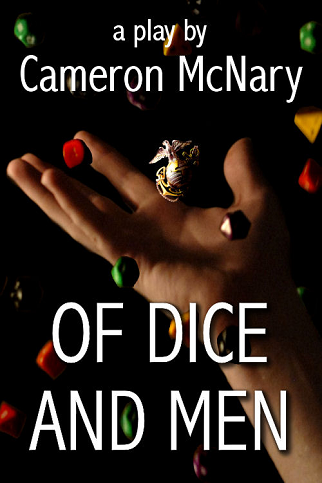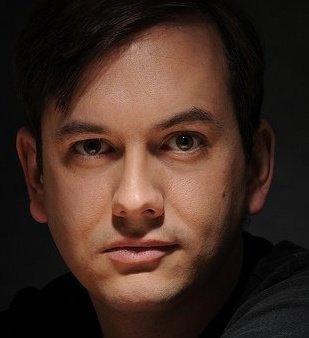 |

AN INTERVIEW WITH CAMERON MCNARY, AUTHOR OF OF DICE AND MEN
Cameron McNary is the author of Of Dice and Men,
a play in two acts about a group of friends and roleplayers who find
themselves having to cope with some life-changing, real-world
decisions. The show has found some critical acclaim, and even changed
some minds about the roleplaying hobby and the people who play
it.Cameron explains the inspiration for the play in the introduction to
the script: Around my 30th birthday, the following things
happened:
Cameron spared some of his time to talk to me about the play and the story that lies behind it.  Tell us briefly what is so great about Of Dice and Men. It's a real, honest-to-god play about D&D players in their 30s, and what happens when one of them enlists to go to Iraq. It's the first work of Gamer Geek Art (that I know of) without a trace of self-loathing in the humor. It's a play that speaks for our tribe; it's one you can take your grandmother to, sit her down, and have her *get* why we game. It repudiates gamer stereotypes, and speaks to a broad, general audience, as well as to ourselves. We (Critical Threat Theatre) premiered it at PAX Prime 2010, in a professional, Equity production, after a very successful reading at PAX East. If I may be frank, we blew the doors off the joint. Packed a 550-seat theatre, turned away too many people to count, just... rocked the house. It was one of the high points of my artistic career. The play made Tycho's (of Penny Arcade) mom cry, a lot, and then go watch her son play D&D for the first time ever (at this event), and then apologize to him for the D&D/fantasy-related rift that had existed in their relationship in his youth. He wrote about it on the Penny Arcade blog. This was also one of the highlights of my artistic career. (You can see some video from that production here.) Why a stage show and not a short story or film? What made you choose this particular medium? Two reasons: 1) I've been working in live theatre for over a decade; it's the medium I know best and am most comfortable with. 2) I saw a unique opportunity to portray the in-game characters using direct address that wouldn't work the same way on screen or in a book. I wanted to show that each gamer's experience of the game is very different - when you see an in-game world portrayed on film, it's usually a shared, generic world with the players in fantasy costume. Having each of the Player Characters come out and address the audience meant I could play with the audience/actor relationship (by having Throg try to attack the audience, for example) in a way that commented on their each of their player's personalities and relationship to the game. It also meant that when I did portray the shared imaginative game-space, I could do it in a nonrepresentational way that I think really captures the joy of tabletop roleplaying - in a way you'd have a really hard time doing onscreen. Ultimately, tabletop RPGs are a shared storytelling experience, which means they ARE theatre, by and for the people playing the game. It translates so well to the stage because RPGs and plays are really just different uses of the same medium. If you don't believe me, roleplay with some actors some time -- generally speaking, we rock it pretty hard once we grok the concept, because it's what we do, just with a different set of conventions.
Are the rights available for anyone to do a production? The rights are available for professional, semi-professional, and academic productions. The ebook of the script is available at all major online retailers, and at Smashwords (link). How has the audience response been so far? I recently got back from watching the opening weekend of the regional theatre premiere at the Impact Theatre in Berkeley. I was blown away by the audience response, and some of the reviews the play has gotten there have just been stellar. For example: -
"If you have ever been a D&D aficionado, get a ticket immediately.
The audience loved it, tittered continuously, laughed loudly, and
applauded uproariously..." -- The Oakland Examiner (link) - "Nerd-on-nerd love is something to behold. It’s sweet, it’s smart, it’s funny – at least it is in Cameron McNary’s sharply etched play Of Dice and Men..." -- TheaterDogs (link) - "Perhaps the most impressive aspect of Of Dice and Men is the ease with which McNary turns a fantasy game into an all-inclusive metaphor — for romance, football, the Iraq War, brinksmanship, and the nature of cliques." -- East Bay Express (link) What personal feedback I have gotten from audiences and individual audience members has also incredibly positive, and gratifying. The audiences at the shows I went to were incredibly responsive, and the ovations at the end were really quite impressive for such a small house. Laughter was consistent, strong, and where I wanted it. I left Berkeley a very happy playwright. Has the positive response to the play inspired you to plan any other geek-related projects in the future? Geeks." We're currently reading scripts, trying to figure out what we want our second project to be. There are plenty of geek-related plays out there; the "great" part is a little tougher. In terms of writing something, I'm definitely open to the possibility of telling another story related to geek culture, but I definitely want to make sure I have a story to tell. The muse hasn't struck yet, but that doesn't mean she won't. Thanks for taking the time to tell us about Of Dice And Men, and I wish you the best of luck with it! Thank you, W.J. It's been a pleasure! 
|

